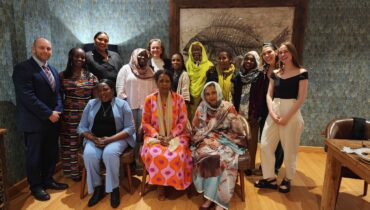The civil war and subsequent humanitarian crisis in Yemen have ballooned to catastrophic proportions. More than 22 million people – three quarters of the population – are in desperate need of humanitarian aid, 18 million people are food insecure, and millions are displaced.
UN Secretary General Antonio Guterres recently stated that humanitarian action cannot solve the humanitarian crisis in Yemen: only an inclusive negotiated political settlement can do so.
Indeed, a political solution for Yemen hinges on the inclusion of a range of marginalized voices in negotiations — most importantly the voices of women, CSOs, and other grassroots organizations — that are currently excluded from peace talks.
“We had a dream to have a peaceful country, a country of law, but now we cannot work together. Civil society, women, and youth should all be involved in decision making. We didn’t reach the dream because people weren’t included.” –Dr. Antelak Al-Mutawakel, co-founder of the Youth Leadership Development Foundation
WHY WOMEN
Research from the Conflict Resolution field—and countless historic case studies—tell us that when all grievances, regardless of their arguable validity, are not acknowledged during a peace process, a subset of the population will continue to feel marginalized.[1] This marginalization can fuel the idea that non-violent negotiations are not as effective as violence to achieve goals. This violent narrative can prevent peace from lasting; indeed, it is what helped drive the Houthi to resort to insurgency and the Saudis to engage in a military campaign.
The inclusion of women, specifically, at the negotiating table can change this narrative. Women are rarely seen as combatants or “legitimate” actors of a conflict. But, like other marginalized political voices, they deserve to help negotiate peace and the future of their country. Furthermore, their participation can help to address critical but often overlooked grievances, making the resulting peace agreement more comprehensive and durable. Indeed, women’s participation in peace talks can increase the durability of a peace agreement by 35 percent.
Yemeni women have the ability and the expertise to provide a mutually enticing vision for all parties and increase the balance of power at the peace table. Yemen’s reconstruction requires women’s expertise in the humanitarian, recovery, governance, and development fields.
PEACE TALKS
There has been virtually no incorporation of women in positions of leadership in Yemeni peace negotiations to date.
The lack of women’s participation was especially prominent in the Kuwait talks of 2016, the most recent peace negotiations. Out of the 26 people included in the negotiating parties, only 3 were women (and they were limited to speaking on behalf of their parties.)
Many activists, international and Yemeni, are calling for more meaningful participation of women, including a women’s group as a party to the negotiating table. Rasha Jarhum, a Yemeni activist, laments the lack of women’s direct participation in the Kuwait talks:
“The Track I peace negotiation process is the most disappointing in terms of inclusive participation [involving] women…The committees that were formed as part of the peace negotiations process such as the de-escalation committees had zero women within their formation…
There were efforts by the UN Envoy to increase women’s participation during the third round of talks…. [but only] 7 women, including myself, were invited to conduct a five-day visit on the sidelines of peace negotiations. All of these efforts unfortunately only reinforce negative stereotypes portraying women as second-class citizens…
When I talked to international community members involved in facilitating peace negotiations about increasing women’s participation, they always respond that they do not want to upset the Yemeni negotiating parties, or that there are no qualified women. Which is unfortunate, because they chose to entertain the warring parties’ excuses and reflect how unaware they are about Yemeni women’s contribution.”
WOMEN’S LEADERSHIP
Women’s marginalization and relative exclusion from Track I negotiations are particularly striking given the strong political and civil roles women hold in Yemen.
Today, women are increasingly filling leadership vacuums left by those who have gone to fight. They are actively participating in the demobilization of recruits, security sector reform, and work to revive the economy and secure medical supplies. They are active in conflict mitigation, transitional justice, and preparing for post-conflict reconstruction.
Before the conflict, women were also active in humanitarian aid and in political mobilization.[2]
Women played an influential role in the 2011 Change Square uprisings, part of the Arab Spring, and held robust leadership roles in the 2015 National Dialogue Conference (NDC) that sought to transition Yemen to a democracy.
Indeed, it was exclusive politics and perceptions of marginalization from political discourse that sent thousands to the streets in 2011, with women at the forefront. Subsequent exclusion—when promised elections were postponed following the NDC—reinvigorated the Houthi insurgency.
WHICH WOMEN
The negotiating table must be open to not just established women bureaucrats, but civil society activists, NGO leaders, grassroots organizers, and others too. Without these perspectives, any negotiations, the development of a future constitution, and the reconstruction process will lack input from experienced and viable leaders of Yemeni society.
The National Dialogue Conference (NDC) provides an example of why including diverse perspectives from marginalized voices is important. While ultimately unsuccessful, the NDC was the first attempt since the 2011 Change Square Protests to create an effective, democratic transitional government in Yemen.
The NDC was a great achievement in and of itself and had some important outcomes—such as securing a 30 per cent quota for women in decision-making. But it did not address some of the most challenging issues facing Yemen, including the temporal scope of the transitional justice mechanisms and questions of immunity. Many marginalized groups were not truly heard, and their grievances unacknowledged; key perspectives from CSOs and grassroots were left out of the conversation.
Established women bureaucrats held leadership roles at the NDC, but women from grassroots, NGO, or CSO parties were not as empowered. Ambassador Amat Al Soswa (ret.), who was the main contributor and organizer of the Women’s Committee at the NDC explains in an interview with the author: “Who exactly was there [at the NDC]? Mostly urban, western-educated women officials [who towed the party line]. There was no representation of the rural woman and no real representatives from the opposing parties… [In the end] the NDC outcome was not sponsored by everyone because it was not entirely representative [of Yemen].”
The NDC serves as a foundation for Yemen’s reconstruction – but to truly create the inclusive negotiated political settlement that Guterres calls for, the negotiating table must accommodate diverse perspectives, especially those of women leaders.
CALL TO ACTION
With Yemen’s rapidly deteriorating security situation, the declining state of public health, and no end to the Saudi military intervention, policymakers must begin to rethink the shape of the negotiating table.
Yemeni women from all levels of society have already proven their capacity locally and nationally to lead their communities. They are equally integral to creating a political solution to end the civil war in Yemen and begin its reconstruction process.
The appointment of new UN Envoy Martin Griffiths to the Yemen mission, a credible mediator who has a reputation for supporting gender-inclusive negotiating tables, is a hopeful sign for future talks. July 4, 2018 brought a public message from the new Envoy who remained hopeful of renewed political negotiations between the warring parties.The new negotiating table, however, must include appropriate representation of all legitimate actors at the table. Inclusion of new voices, rather than exclusion, can build the consensus that fosters a positive peace and reduce conflict recidivism in Yemen.
As war and suffering do not discriminate across gender, party lines, religious affiliations or race, neither should peace.
Lauren Javins graduated from the M.A. in Conflict Resolution program at Georgetown University in May 2018. Her concentration was in Transitional Justice with a focus on societal reconciliation post atrocity. Previously, she was a Peace Corps Volunteer in Mongolia from 2014-2016.This blog post is part of a longer policy paper for the diplomacy class Rebuilding Yemen with (ret.) Ambassador Barbara Bodine from the Institute for the Study of Diplomacy at Georgetown University.
[1] Levinger, Matthew. Conflict Analysis: Understanding causes, unlocking solutions. United States Institute of Peace academy guides. Endowment of the United States Institute of Peace, 2013. Pg. 53.
[2] Al-Ashtal, Amel Nejib. “A Long, Quiet, and Steady Struggle: The Women’s Movement in Yemen.” Mapping Arab Women’s Movements: A Century of Transformations from Within, edited by Pernille Arenfeldt and Nawar Al-Hassan Golley, American University in Cairo Press, 2012. Pg 239


